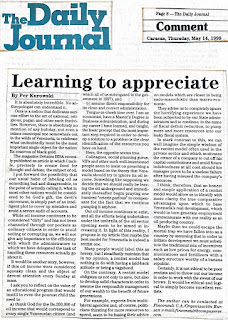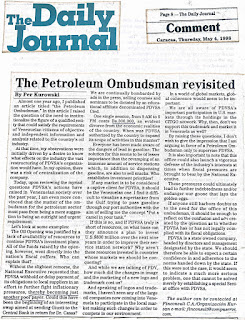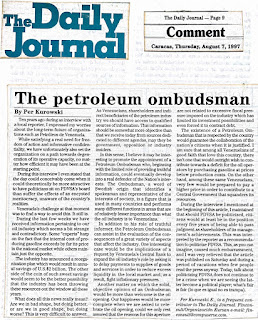Thursday, July 21, 2022
Sunday, April 24, 2022
A Bureaucracy Autocracy has been constructed with stealth
PS. I have recently enlisted #AI ChatGPT - OpenAI to help me fight the Bureaucracy Autocracy. "What would you opine of risk weighted bank capital requirements with risk weights assigned for political reasons?"
Here's a letter the Washington Post published August 2023. It refers to Paul Volcker’s valiant courageous and honorable confession on what happened 1988. Thanks @PostOpinions for not ignoring it.
Wednesday, October 17, 2018
Having fallen so low, Venezuela should take that golden opportunity to try reach the stars.
That to me is unacceptable. After all the blood, sweat and tears Venezuela has had to spill during the last decades, it really deserves a brand new future.
https://theoilcurse.blogspot.com/2015/07/cidhdenunciasoas.html
Friday, September 23, 2016
Curses and blessings quite often come hand in hand
Tuesday, July 29, 2014
Today I was censored in my homeland Venezuela
PS. But, on the other hand can you think of "Daddy why are you not censored?" Indeed it is not easy to live in a low profile dictatorship!
Thursday, July 10, 2014
One question, and one opinion, on the Scottish independence referendum of September 18, 2014
Question: How many Scots under 16 years of age will not have a chance to vote on what will affect them the most? Why not give all thirteen and more that right and allow those over 50 to vote only if they do so in representation of a child or a grandchild under thirteen? That could really make this vote on the declaration of independence a real game changer.
Opinion: The draft of June 2014 of the Scottish Independence Bill states that “In Scotland, the people have the sovereign right to self-determination”. Great, but unfortunately, it would not seem that “self-determination” will include each Scottish citizen managing his share of natural resources his country has been endowed with, like oil.
And friends, speaking as an oil-cursed Venezuelan, who has had to live in somebody else’s business, until he could not endure that anymore and had to leave his country, you might think more about this issue.
If not, I assure you that this independence of yours could turn out to be a real Pyrrhic one, when all of you Scots will become dependent on the clan that manages those natural resource revenues for you.
Please don’t let that happen!
Wednesday, March 26, 2014
Me, in favor of and against... free market think tanks
Thursday, March 13, 2014
The Hugo Chavez Revolution cheated the poor
Tuesday, March 05, 2013
Hugo Chavez and the poor of Venezuela
Wednesday, March 21, 2007
Four Years and Counting in Iraq: Regarding "Lessons of War"
Thursday, November 20, 2003
The curse
The curse
Lately, articles that analyze the supposed curse that weighs on countries rich in oil resources have been published like rice. At first glance it would seem that there is a certain basis of support for these theories of obscurantism, however, for proper reading, it is important to clarify one or another detail.
First of all, and judging by the immense number of existing offers to free ourselves from this cursed burden, it is obvious that we are not talking about a common curse. There are even those who generously offer to assume their risks, even paying us for the right to such sacrifice.
A suggested exorcism is to leave OPEC to sell oil at its marginal extraction cost, thus guaranteeing that we avoid earning the dirty rent for oil. Another way is to privatize it, against a tasty and tempting initial payment, to cancel the current public debt... and get into debt again? As you can see, both methods have a strange similarity with selling the sofa.
Finally, considering that the European treasury earns about 100 dollars net per barrel, while those who sacrifice the resource only get 25 dollars, gross, it is not very obvious who is the cursed one.
The indisputable thing is that oil revenues have not been used well, but as you can understand, this has less to do with the abundance of resources and more to do with the damn system used to distribute them. Currently, the entire oil revenue enters the government's coffers alone and effortlessly, thus unbalancing the democratic system, since we all know that the happy holder of a full oil checkbook has little incentive to pay attention to the citizen.
How do we get out of this? To begin with and due to the obvious and incurable lack of talents of our rulers, we must apply the parable of the talents in reverse and bypass them, delegating a greater part of the administration of oil revenues directly to the citizens.
However, since we civil society members are not very different from our politicians, like-minded, like-minded, perhaps we should, just in case, pay the oil dividends with educational tickets.
Chances of it? Few, due to that true curse, the one that leads our leaders to believe that everything bad in the past is miraculously cured with their arrival in power (with the checkbook) and, us, to believe them.
Translated by Google
https://petropolitan.blogspot.com/2003/11/la-maldicion.html
https://theoilcurse.blogspot.com/2003/11/the-curse.html
Thursday, February 01, 2001
No, thanks
No, thanks
Tuesday, June 15, 1999
Let's talk about official advertising (and exchange rate anorexia)
Translated by Google from an OpEd published June 15, 1999
Thursday, May 14, 1998
Learning to appreciate
Monday, May 04, 1998
The Petroleum Ombudsman revisited
Friday, March 20, 1998
Should we abandon OPEC?
Friday, September 19, 1997
Guaranteed - 100% artificial
Thursday, September 04, 1997
It just must get smaller













